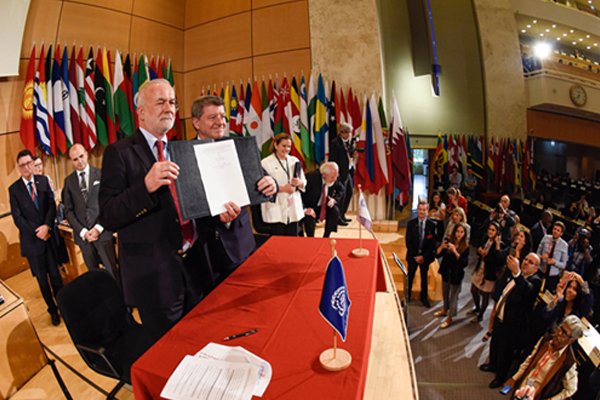|
International Labour Conference Ends With Adoption Of Key Convention And Declaration
The Centenary Conference of the International Labour Organization (ILO) ended on Friday with the adoption of an unprecedented Convention and accompanying Recommendation to combat violence and harassment in the world of work, as well as a Declaration charting the way towards a human-centred future of work.
The ILO Centenary Declaration for the Future of Work, 2019 , is a reaffirmation of the relevance and importance of the ILO’s mandate in the changing world of work, a strong statement of intent, a mobilizing call, and a road map for action by the ILO itself.
“What we have adopted today is a roadmap, a compass to take us forward in the future of this Organization, because the future of work is the future of our Organization,” said ILO Director-General, Guy Ryder.
The Declaration looks to the future of work with a human-centred lens. It has a strong focus on enabling people to benefit from changes in the world of work, by strengthening the institutions of work to ensure adequate protection of all workers, and by promoting sustained, inclusive and sustainable growth and full and productive employment.
Specific areas for action identified include:
• The effective realization of gender equality in opportunities and treatment
• Effective lifelong learning and quality education for all
• Universal access to comprehensive and sustainable social protection
• Respect for workers’ fundamental rights
• An adequate minimum wage
• Maximum limits on working time
• Safety and health at work
• Policies that promote decent work, and enhance productivity
• Policies and measures that ensure appropriate privacy and personal data protection, and respond to challenges and opportunities in the world of work relating to the digital transformation of work, including platform work.
UN Secretary-General António Guterres joined some three dozen world leaders who, in the course of the two-week International Labour Conference (ILC), delivered strong messages of support for the ILO and its social justice mandate.
“You are carrying forward the torch that was lit one hundred years ago to help build a new world – a world based on social justice, founded on a model of inclusion – with governments, workers and employers at the decision-making table together,” Guterres said.
Guterres told delegates that the Declaration “marks an historic opportunity to open a door to a brighter future for people around the world.”
“The Declaration is ambitious – setting out the basis for delivering the ILO’s mandate in its second century. But the Centenary Declaration is much more than a statement of wishes or intent. The Declaration proposes a shift in the paradigm of how we look at development,” he said.
Guterres also welcomed the adoption of the Violence and Harassment Convention, 2019, which is accompanied by a Recommendation.
The Convention recognizes that violence and harassment in the world of work “can constitute a human rights violation or abuse…is a threat to equal opportunities, is unacceptable and incompatible with decent work.” It defines “violence and harassment” as behaviours, practices or threats “that aim at, result in, or are likely to result in physical, psychological, sexual or economic harm.” It reminds member States that they have a responsibility to promote a “general environment of zero tolerance”.
The new international labour standard aims to protect workers and employees, irrespective of their contractual status, and includes persons in training, interns and apprentices, workers whose employment has been terminated, volunteers, jobseekers and job applicants. It recognizes that “individuals exercising the authority, duties or responsibilities of an employer” can also be subjected to violence and harassment.
|



